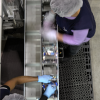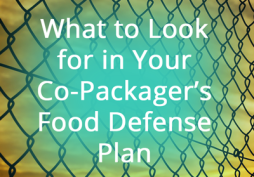What to Look for in Your Co-Packager’s Food Defense Plan
Posted By: Karl Wirtz
Posted On: 24th June ‘ 15
A co-packaging company must have a thorough food defense plan.
Without one, the integrity of your products and brand reputation remain at risk.
Food safety and defense certificates are indicators of high-quality practices, typically denoting that a co-packager has invested time and resources in a strategy.
To help ensure your co-packaging company has a viable food defense plan, we have put together a short guide about practices to look for:
Differentiation Between Food Defense and Food Safety
A co-packager’s food defense plan must be closely related to food safety policies, but have a different focus. Whereas food safety protects against accidental contamination, food defense is concerned with intentional damage.
Intentional violence is hard to predict. An attacker could use chemicals, biological agents, or other harmful substances to cause damage.
This means that a co-packager’s food defense plan must be thorough, including pre-emptive policies to stop random attacks.
Control of the Production Floor
A contract packager must protect its production floor.
Here are three ways co-packagers should control the production floor to safeguard food:
- Restrict Access to the Floors
All doors that lead into co-packaging facilities should be key-coded. Only trusted employees must know the codes to access the production floor and certain other areas of the facility.
Though floor workers are not permitted to let strangers in, management teams occasionally bring in guests. They must sign-in and cannot freely roam around the facility.
- Bar Access to Chemical and Maintenance Rooms
Chemical and maintenance rooms contain substances that could damage foods and confections.
Entrances to these rooms, either through a key code or other type of security, must be separately protected.
Only designated people should access these rooms, preventing malicious or disgruntled individuals from handling dangerous material.
- Designate a Protected Area for Shipping and Receiving
Co-packing facilities should have a caged area that drivers enter when making a delivery. While waiting for papers to be reviewed, it prevents them from wandering around the facility. Similar to guests, drivers must sign in.
This process also gives employees ample time to inspect the delivery and guarantee safety.
Adherence to the FDA’s Employees FIRST Initiative
Employees are the first line of food defense.
Many counties, including Canada, recommend specific food defense plans. But the Food and Drug Administration (FDA) in the United States created the first thorough system that harnesses the power of employees.
Below is a video that explains the theories behind, and benefits of, the FDA’s FIRST plan:
Here is the meaning of the FIRST acronym, which employees must adhere to:
- Follow the established company food defense plan
- Inspect your work area and surrounding areas to identify any foreign substances
- Recognize anything out of the ordinary, especially something that is potentially harmful
- Secure all ingredients, supplies, and finished products to prevent intentional tampering
- Tell management if you notice anything unusual or suspicious
Employees should receive FIRST training. This way, co-packers have a large team of people who actively protect against food attacks.
A co-packaging company must have a complete food defense plan. Without one, the integrity of your edible products is at risk of being compromised.
>> WG Pro is a co-packager and co-manufacturer that has an active food defense plan to ensure product safety. Contact us today to learn how we can help meet your business goals.
More from WG:
- Congratulations to David John Vongalu, Winner of This Year’s WG Leadership Award at Sheridan College’s Pilon School of Business - June 23, 2017
- 4 Future-Forward Co-Packing Trends - May 2, 2017
- WG Connects with Companies Eager to Grow in North America at the International Sweet and Snack Fair in Germany - February 23, 2017


















